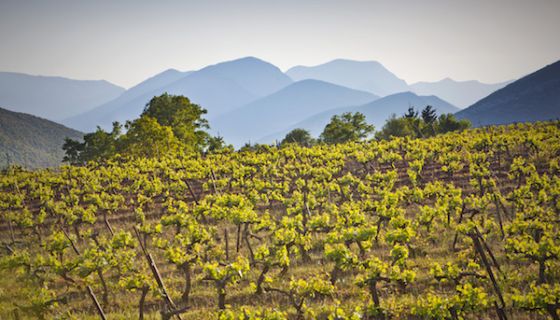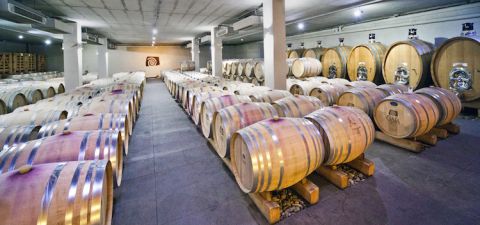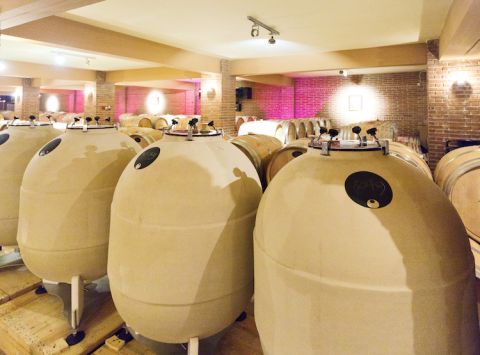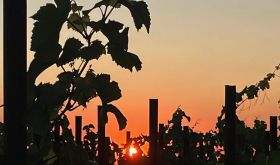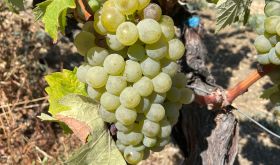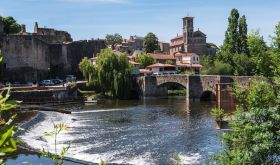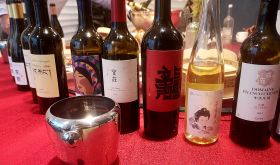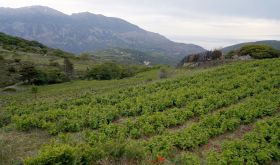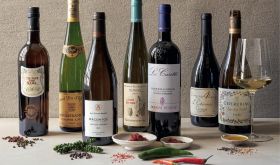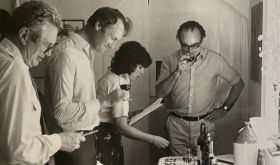‘Apite!’ cries the judge. As the starting rope is hurled to the ground, dozens of nude athletes sprint down the sandy track. The victorious are crowned with a wreath of wild celery, while any false-starters are publicly flogged with an olive branch. Crowds from every part of the known world roar on this brutal spectacle, fuelled by copious jugs of Fliasion wine. Welcome to the Nemean games.
Fast-forward 2,600 years and this forerunner to the modern Olympics is back in the remains of its original stadium, albeit fully clothed. Modern Nemean wine is also regaining its international audience, drawn to the results of better winemaking and a gradual handover to the new generation.
The Nemea wine region is a municipality of Corinthia prefecture, one of the seven prefectures of the Peloponnese.
The 3,000-hectare Nemea PDO, established in 1971, is for dry or sweet red wines made solely from the indigenous Agiorgitiko (pronounced ‘eye-your-yee-tiko’). Yiannis Paraskevopoulos, winemaker and co-founder of Gaia Estate, ventures that blending 20–30% of Merlot into Sangiovese would give you something similar to Agiorgitiko, explaining that ‘It is definitely not a big, blockbusting Cab.’
The revolution in quality in Nemea is being led by a number of young winemakers, most under the watchful eye of their parents or mentors. Most have studied abroad, typically in France or the US.
George Skouras, President of Winemakers of Greece, said that there were around 70 wineries in Greece when he started his business, but now there are over 1,400. In the last decade, there have been more start-ups in the wine sector than in any other, many of them young people with small wineries.
In Greece’s relatively patriarchal society, the large number of women involved at a senior level in wineries was a welcome surprise. The only explanation I was given for this was that the winemakers had happened to have daughters rather than sons, but the fathers had clearly been impressed.
Wine tourism
Most travellers on the Nemean wine roads either stay in Corinth or Loutraki to the north, or the coastal resort of Nafplio to the South. The actual village of Nemea is relatively undiscovered by tourists. In spectacular surroundings and with the major archaeological sites of Ancient Nemea and Ancient Kleones nearby, travellers who value an authentic Greek experience will be richly rewarded for their efforts. What the tavernas lack in terms of online presence, and occasionally even menus, is more than made up for by the warmth of the service and the quality of the food. Value was also universally excellent, dinner for two with a local wine rarely costing more than €30, even with our tendency to vastly over-order.
Nemea Wine Land, run by Nikos and Mary Bouzinelos, opened in December 2017 and carries wines from around 30 Nemean producers. It often puts on extensive tastings and is well worth a visit.
Dervenakion 30, 20500 Nemea +30 274 602 2487
Where Nemea really comes into its own is the number of wineries within a short distance of the town, with Mitravelas in the town itself and a short walk taking you to Lantides in Xerokampos to the south and the co-operative to the north. Most producers offer full tours of their vineyard and cellars, often charging nothing or very little, with a welcome which explains why the Greeks have a word for kindness to foreigners. Wineries are open most days of the week.
At the end of August, Nemea plays host to the Great Days of Nemea festival, with almost every winery throwing open their doors to local people, tourists and professionals alike. Many offer generous amounts of free wine, barbecued food and music. Equally as popular is the opportunity at Lafazanis to tread grapes in the traditional shallow concrete lagars, with most of the resulting grape juice drunk by thirsty guests before it gets anywhere near the fermentation tanks.
Estates to visit
Mitravelas
Founded in 1913, this estate is the oldest modern winery in Nemea and the only one in the town itself. Konstantinos Mitravelas, alongside ex-Gaia winemaker Demetris Akrivos, produce a small range of high-quality bottled wines from Moschofilero and Agiorgitiko. At the time I visited, plans were underway for a complete overhaul of the winery equipment, construction of a new barrel cellar and the conversion of their old concrete tanks into an atmospheric tasting room.
Back in London, I arrived at Mitravelas’ stand at the London Wine Fair to find gold Decanter World Wine Awards labels being affixed to bottles of their 2016 Ktima, one of only two Greek red wines to win this accolade in 2018. This recognition followed the success of the 2014 vintage of their top bottling, Old Vineyards, which won platinum and Best Greek Red at the 2017 DWWA.
23 Christopoulou, Nemea 20500 +30 274 602 3028; info@mitravelas.gr
Aivalis
Christos Aivalis, who founded this 14-hectare estate in Petri in 1996, continues his work in the very old vineyards, while his 28-year-old son Sotiris has taken over the winemaking. No fertiliser is used and the estate is dry farmed.
The style of their wines seems to stand a little apart from the rest of Nemea. It would be easy to criticise the price of the two top wines (Tessera 4 is around €70, the new wine Armakas around €120) and they may not appeal to some opponents of the 'Parker style', but I found them well balanced and surprisingly easy to drink.
4th km Petri, Nemea 20500 +30 275 202 1175
Palivou
Established in Ancient Nemea by George Palivos, who in 1995 replaced the old traditional treading tank with a contemporary winery. His daughter Evangelia, who seemed to know every inch of their 40-hectare estate, has now taken over the winemaking. The second biggest holding in Nemea, the vineyards are mostly planted with Agiorgitiko, with some Roditis, Malagousia, Chardonnay, Merlot, Cabernet Sauvignon and Syrah, all of which are farmed organically. Ranging from 300m to 600m, they cover various soil types including calcareous, clay, loam, sand and gravel.
Ancient Nemea 20500 +30 274 602 4190; info@palivos.gr
Gaia
Owner/winemaker Yiannis Paraskevopoulos and business partner Leon Karatsalos make wines on the volcanic island of Santorini as well as Nemea, where they set up on the south-western slopes of Koutsi, at an altitude of 650m, in 1994. After studying in Bordeaux, Paraskevopoulos worked for Boutari, and today combines his winemaking with the professorship of oenology at Athens technical institute, training many of the younger generation of winemakers.
The 2001 Gaia Estate, produced only in good vintages, was the first Greek wine based 100% on a Greek varietal to win a Decanter International Trophy.
Koutsi 20500; Phone: +30 210 805 5642-3, +30 274 602 2057 info@gaiawines.gr
Semeli
Semeli opened their large winery in 2003, at 600m above sea level in the renowned village of Koutsi, a stone’s throw from Gaia. Their top white, Thea, is kept on the fine lees for an unusual and almost Burgundian take on Moschofilero, the skills of winemaker Leonidas Nassiakos being rewarded with a gold medal at the 2017 Decanter World Wine Awards.
They also have a guesthouse. On my visit in 2018, six rooms were just being completed. The terrace, with its rose bushes and view down the valley, is glorious in summer, while open fires and comfortable sofas in the large, open-plan lobby make for a cosy winter retreat.
Epar Od Kiatou, Koutsi 20500 info@semeliwines.gr
Skouras
George Skouras first made wine in his father’s garage in Argos, leasing vineyards and renting winery equipment from other Nemean producers. Today, grapes from their vineyards in Koutsi, Asprokampos and Gimno arrive at the ultra-modern winemaking facility in Malandreni, opened in 2004.
As well as these eggs, a laboratory, around 80 stainless steel fermentation tanks, presses with a crushing capacity of 800 tonnes, three temperature-controlled warehouses, a 1,000-barrel cellar and a 3,000 bottles-per-hour bottling line, it includes reception halls lined with works of art, large verandas and a beautiful tasting room, which is also a contemporary bistro.
10th km Argous – Sternas, Μalandreni, Argos 212 00 +30 275 102 3688 info@skouras.gr
Lafkiotis
The Lafkiotis family started making wine in 1963 in Ancient Kleones. Although they have no vineyards of their own, they work with local growers under long-term contracts to retain control over the quality of the fruit. Their tasting room must be among the most beautiful in Nemea – a charming combination of stone and polished dark wood with a spectacular view from the arched windows.
Ancient Kleones +30 274 603 1000 info@lafkiotis.gr
Bosinakis (Mantinia)
While Bosinakis are in neighbouring Mantinia rather than Nemea, their Moschofileros are impossible to leave out. Established in 1992, brother and sister Sotiris and Katerina work alongside their mother, and until 2009 made wine for other wineries who had vineyards but no winery in Mantinia and wanted to use PDO Mantinia (to do so, the wine has to be vinified in Mantinia).
Stenón, Arkadhia 22100 Mantinia +30 271 057 2767 wines@bosinakis.gr

